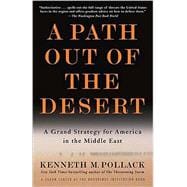
A Path Out of the Desert A Grand Strategy for America in the Middle East
- ISBN13: 9780812976427
- ISBN10: 0812976428
- eBook ISBN(s): 9781588367624
- Edition: Reprint
- Format: Paperback
- Copyright: 2009-08-25
- Publisher: Random House Trade Paperbacks
-
Your order must be $35 or more to qualify for free economy shipping. Bulk sales, PO's, Marketplace items, eBooks and apparel do not qualify for this offer.








